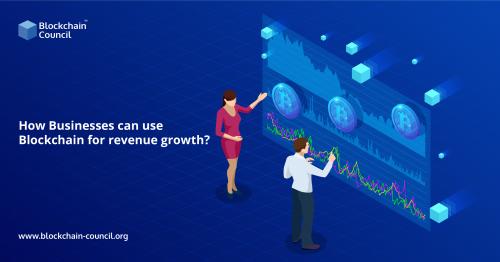How Businesses can use Blockchain for revenue growth?

Blockchain technology is a foundation for producing financial services that will cover many of today's virtual market system's holes. Blockchain links a group of entities and enables data to be synced across many independent parties, while conventional databases only store information for a single entity.
Small businesses are highly interested in Blockchain development. It enables individuals to make and receive payments, have access to investment and savings products, and build a credit history in a cost-effective and efficient manner. Greater access to this technology may help SMEs thrive, therefore creating employment and improving the economy.
Blockchain technology has the potential to fundamentally change the global business environment. Nonetheless, despite the hype, the distributed ledger technology has failed to bring any real-world advantages to enterprises. Blockchain certification India is on the increase as more companies seek blockchain professionals for their employees.
Analysts are discussing blockchain in terms of its myriad possible uses. However, little has been spoken about how new technology might help companies increase revenue, attract more customers, or enhance their bottom line.
What is the reason for this?
The reason for this is because, despite its promise, blockchain remains disconnected from reality. Business executives recognise that a distributed ledger will increase the security of online transactions, but many are unsure how this would help their company.
This situation is going to change. Executives in a range of industries will grasp how this technology may assist them in increasing their revenue. Thanks to blockchain, businesses will have far more access to the most valuable commodity in the corporate world today: data.
Data is at the heart of any business.
Businesses seek to understand more about their customers and find new ones. As a consequence, they pay companies like Amazon and Facebook for consumer information. This information, which includes shopping patterns, personal preferences, and a myriad of other characteristics, is critical.
Businesses have gotten used to paying a certain amount of money for a fixed quantity of data obtained primarily from trusted sources. In this approach, Amazon, Facebook, Google, and others have created a data oligopoly. They are the most dependable sources of business data.
Businesses would want to purchase and trade data directly among themselves, cutting out the intermediary. This would have an immediate effect on the bottom line of numerous enterprises across various sectors.
However, this has been difficult since businesses have no means of verifying whether or not they are acquiring genuine data. Unless the source can be entirely trusted, the data will be worthless.
And then there's blockchain. Because of the distributed ledger design, information transferred online is far more difficult to forge or alter. It may add a layer of trust that did not previously exist. Data transferred using blockchain technology is verified data that does not need extra verification from a member of the data oligopoly.
Wrapping up
In the corporate realm, blockchain has yet to be linked with conventional commercial reasoning. Many people are still ignorant of its significance. Blockchain, on the other hand, is all about data, and data is what drives today's market.
Marketplaces that enable organisations to buy and sell data directly from one another will herald the beginning of the end of the data oligopoly. It will make one of the most valuable assets in the business world more available to anyone. Enroll in an online Blockchain course to get started.
Post Your Ad Here
Comments